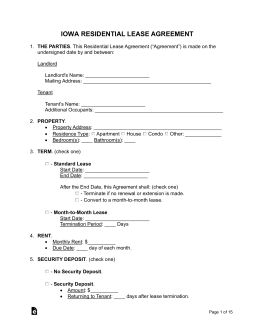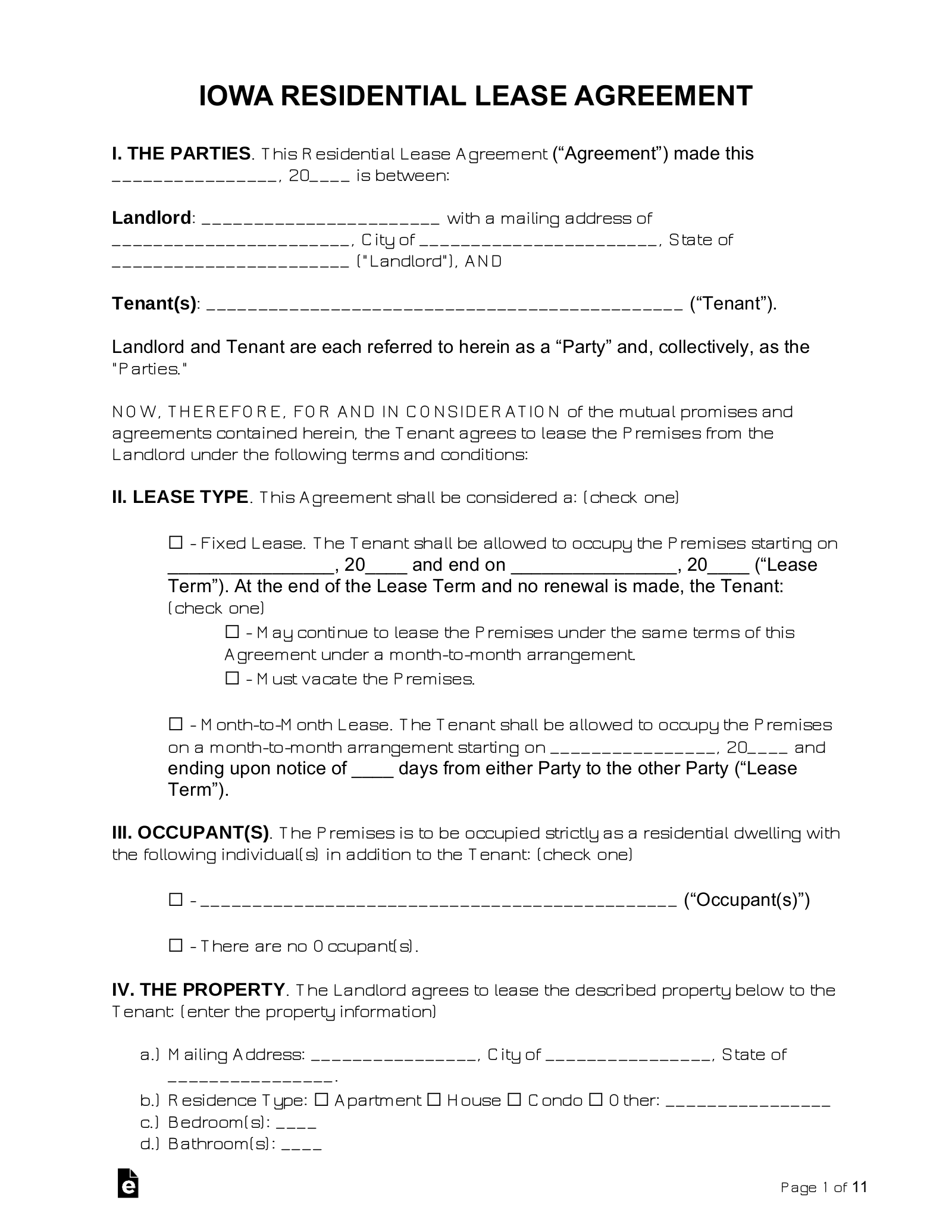Updated December 06, 2023
An Iowa lease agreement is a real estate contract used by a landlord when renting residential or commercial property to a tenant. In the lease, the tenant will agree to pay monthly rent and maintain the property until termination. Before a lease is signed, the landlord will perform a credit check and verify the tenant’s income either through their employer, copies of pay stubs, or past tax returns.
The tenant will be obligated to pay the first month’s rent and any security deposit prior to moving into the premises.
Table of Contents |
Agreement Types (7)
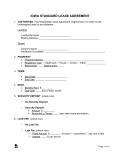 Standard Residential Lease Agreement – For a fixed-term residential agreement. Standard Residential Lease Agreement – For a fixed-term residential agreement.
Download: PDF, MS Word, OpenDocument |
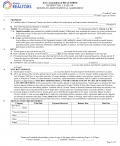 Association of Realtors Agreement – Has the option to be written as a fixed or month-to-month arrangement for residential tenancies. Association of Realtors Agreement – Has the option to be written as a fixed or month-to-month arrangement for residential tenancies.
Download: PDF |
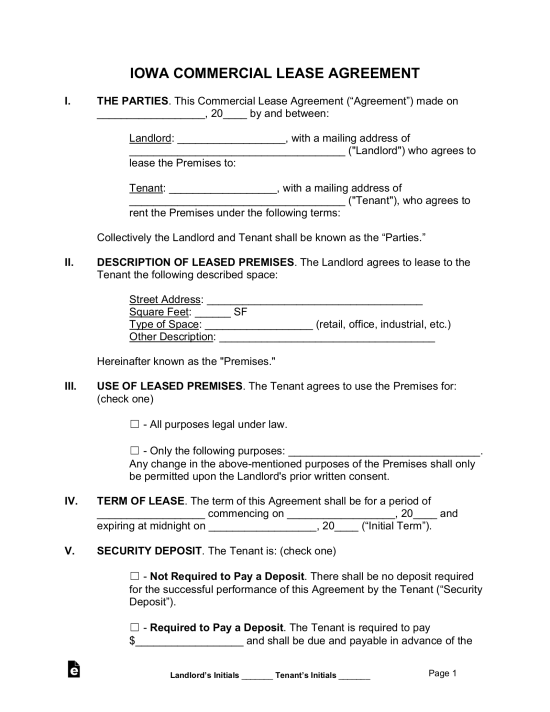 Commercial Lease Agreement – To be used for the renting of property for business purposes such as office, industrial, or retail space. Commercial Lease Agreement – To be used for the renting of property for business purposes such as office, industrial, or retail space.
Download: PDF, MS Word, OpenDocument |
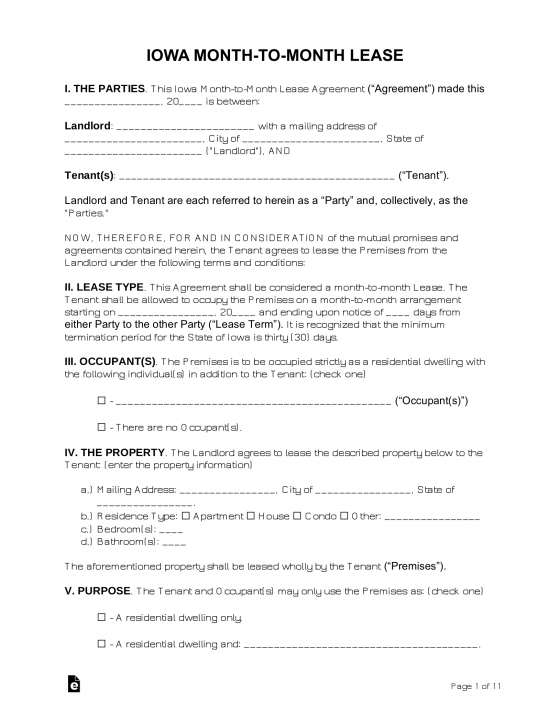 Month-to-Month Lease Agreement – Known as a tenancy at will. Under § 562A.34, the landlord or tenant has the right to cancel with at least 30 days’ notice. Month-to-Month Lease Agreement – Known as a tenancy at will. Under § 562A.34, the landlord or tenant has the right to cancel with at least 30 days’ notice.
Download: PDF, MS Word, OpenDocument |
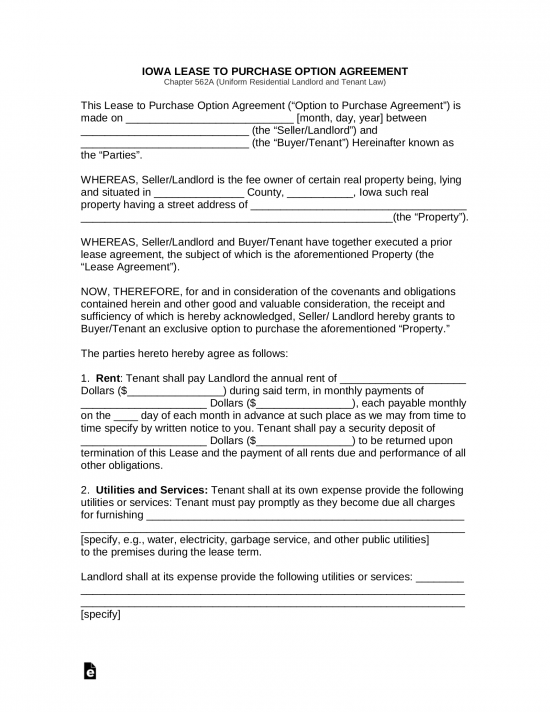 Rent-to-Own Lease Agreement – Standard residential contract with a time period for the tenant to elect to buy the property if they choose. Rent-to-Own Lease Agreement – Standard residential contract with a time period for the tenant to elect to buy the property if they choose.
Download: PDF, MS Word, OpenDocument |
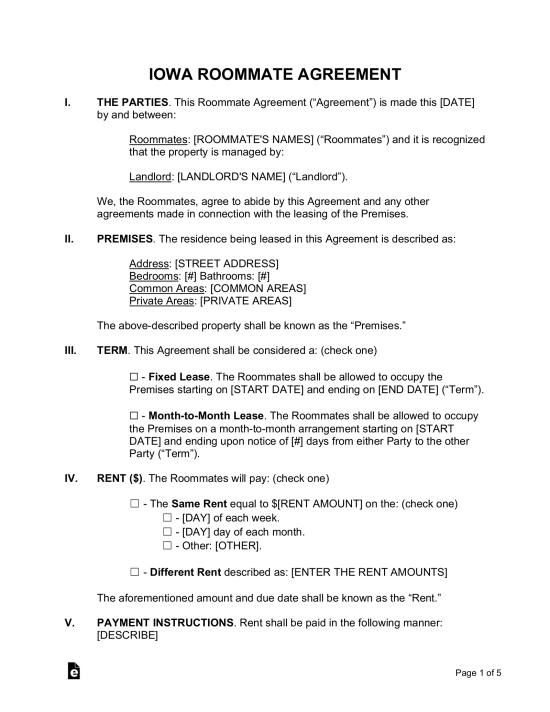 Room Rental (Roommate) Agreement – For the individuals renting the same space with separate bedrooms in order to manage the common areas and split the payments for utilities/services. Room Rental (Roommate) Agreement – For the individuals renting the same space with separate bedrooms in order to manage the common areas and split the payments for utilities/services.
Download: PDF, MS Word, OpenDocument |
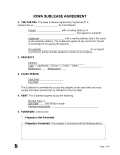 Sublease Agreement – When a tenant decides to rent the same property to someone else in order to cover them for the lease they are obligated under. Sublease Agreement – When a tenant decides to rent the same property to someone else in order to cover them for the lease they are obligated under.
|
Required Disclosures (4)
- Agent/Landlord Identification – Any person authorized to act in the place of the landlord must be listed in the contract in addition to the address where notices are received.[1]
- Lead-Based Paint Disclosure – Federal law mandates that landlords and managers inform any new tenant of the possibility of lead-based paint if the property was built before 1978.
- Shared Utilities – The landlord must disclose if there are shared utility charges and the rate at which the charges and services are calculated and billed to the tenant.[2]
- Comprehensive Environmental Response Compensation and Liability Information System – If the property is listed in this database, provided by the Federal Environmental Protection Agency, it must be known to the tenant in their contract. Refer to this Wikipedia page or search specific site locations at NETRonline.[3]
Security Deposits
Maximum Amount – The landlord may not charge more than two months’ rent from what is written in the rental contract.[4]
Collecting Interest – Iowa state law does not require the landlord to hold a security deposit in an interest-bearing account. If the landlord chooses to do so, any interest earned on the deposit during the first five years of tenancy belongs to the landlord.[5]
Returning – The landlord is required to give back the deposit within 30 days from the date the tenant has vacated the property.[6]
- Itemized List – If any portion of the security deposit is used to restore the dwelling unit, the landlord must furnish a written statement to the tenant specifying the nature of the damages.[6]
When is Rent Due?
Grace Period – Rent is due on the day agreed upon by the landlord and tenant. There is no current rent grace period in Iowa.[7] If the rent is not paid, the landlord may issue a three-day notice to quit.
Maximum Late Fee – There is a two-tiered system for late penalties depending on the monthly rent:[8]
- $700 or less – The maximum is $12 per day and no more than $60 per month.
- More than $700 – The maximum is $20 per day and no more than $100 per month.
NSF Fee – $25 is the maximum that can be charged for a bad check.[9]
Withholding Rent – A tenant may, in certain circumstances, deduct from their rent the cost to procure reasonable amounts of hot water, running water, heat, and essential services if the landlord has failed to provide these necessities.[10]
Right to Enter (Landlord)
Standard Access – The landlord must notify the tenant within a 24-hour period before entering the premises for maintenance, inspection, or any other type of non-emergency.[11]
Immediate Access – The landlord may enter the property without the consent of the tenant during an emergency.[12]
Abandonment
Absence – According to Iowa law, a rental agreement may require a tenant to notify the landlord in advance of an anticipated extended absence. If the tenant fails to give notice, the landlord may recover damages from the tenant.[13]
Breaking the Lease – If the rental agreement is terminated, the landlord may have a claim for rent and a separate claim for actual damages for breach of the rental agreement, along with reasonable attorney fees.[14] The landlord does have a duty to mitigate damages.[15]
Tenant’s Utility Shutoff – If the tenant fails to comply with building and housing codes in a way that materially affects health and safety, the landlord may give a seven-day notice to quit. If the tenant does not remedy the situation within that timeframe, the landlord may terminate the lease.[16]
Unclaimed Property – Iowa state law requires the holder of abandoned property worth at least $50 to communicate with the owner of the property and take necessary steps to avoid the presumption of abandonment.[17]

